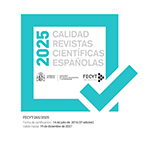Fear, silence, and deliberation: The inhibition of opinion in Thucydides
Abstract
Thucydides is considered one of the best sources of information about the argumentative practice at work in democratic deliberation. In this paper, I analyze one of the vices that, according to the historian, would appear in the political scene once Pericles died: the exploitation of fear to obtain momentary victory in the Assembly. One of Pericles’ devices was to incite some kind of sensible fear in his audience. With it, the Athenian politician hoped to direct deliberation in the interest of the common good. After Pericles’ death, Thucydides bear witness to the substitution of dialectical and open confrontations by practices that involved intimidation of the opponent, calumnies or obstructionism. As the historian says, once mistrust and suspicion took hold of the citizens, the coup d’etat 411 members found it very easy to silence the opposing voices and so, establish a state of terror.Downloads
Article download
License
In order to support the global exchange of knowledge, the journal Gerión. Revista de Historia Antigua is allowing unrestricted access to its content as from its publication in this electronic edition, and as such it is an open-access journal. The originals published in this journal are the property of the Complutense University of Madrid and any reproduction thereof in full or in part must cite the source. All content is distributed under a Creative Commons Attribution 4.0 use and distribution licence (CC BY 4.0). This circumstance must be expressly stated in these terms where necessary. You can view the summary and the complete legal text of the licence.












